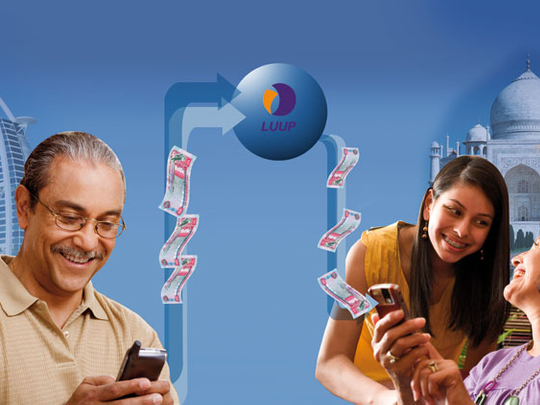
Dubai: The UAE's personal remittance market is expected to grow by 20 per cent to Dh120 billion this year, up from Dh100 billion ($27 billion) last year, a top industry official said.
In a rough estimate, this could be equivalent to about 12 per cent of the country's gross domestic product, estimated to touch Dh1 trillion by the end of this year.
The driving force behind the increase in remittances is the monitored growth in air traffic, as more people come to the UAE to visit or live.
The market is served by 110 exchange companies with a network of more than 600 branches across the UAE, which has a population of about six million, 82 per cent of which is made up of expatriates, including four million workers — most of whom regularly remit money.
The UAE is the second largest remittance source market in the GCC after Saudi Arabia.
"About 85 per cent of the market is served by six to seven large exchange companies," Mohammad Ali Al Ansari, Chairman of the Foreign Exchange and Remittance Group (FERG), who is also the chairman and managing director of Al Ansari Exchange, told Gulf News.
The Foreign Exchange and Remittance Group (FERG), which was set up a few years ago, is a representative body that takes up issues on behalf of exchange companies and supports the growth and development of its members within the scope and regulations of the UAE Central Bank. It currently has 44 members.
Officially recorded remittance flows to developing countries reached $316 billion in 2009, down six per cent from $336 billion in 2008, according to estimates from the World Bank.
Improved prospects
"With improved prospects for the global economy, remittance flows to developing countries are expected to increase 6.2 per cent in 2010 and 7.1 per cent in 2011, a faster pace of recovery in 2010 than our earlier forecasts," said Dilip Ratha, a World Bank expert on remittances.
Al Ansari Exchange, which says it employs 1,500 professionals across its 96 branches, is one of the largest exchange companies in the UAE.
Mohammad Al Ansari said that despite the slowdown in the economy, the remittance business is growing.
"We have not seen a drop in the number of customers, at least among our branches," he said.
This is mainly because except for perhaps the real estate and construction industry, other sectors have shown resilience and continued to grow and the job losses have been minimal.
The growth in other emirates has more than balanced the decline in remittance flows from Dubai.
Moreover, most expatriates remit money regularly for family maintenance and savings.
The Wage Protection System (WPS) introduced by the Ministry of Labour in co-ordination with the Central BankE has also brought thousands of workers closer to the exchange houses.
"We now function as a one-stop shop for their financial needs — disbursement of salaries and handling remittances — the two most important aspects of their lives," Al Ansari said.
"The competitive exchange rates and convenience in fast-track payments have reduced the needs for hawala or informal channels.
"As a result, foreign workers are more comfortable in remitting money through official channels," he added.
Al Ansari Exchange handles over a million customer transactions per month and handled more than Dh40 billion in remittances in 2009.
With the current trends, Al Ansari said he was confident of at least a 20 per cent growth in business this year. Al Ansari Exchange is very active in South Asia and holds the number one rank in the Philippines.
Partnerships
The company has also signed partnerships to expand its products and services, including more convenient payments for American Express card holders, Salik recharge services in collaboration with RTA, and money transfers to Egypt through an agreement with the National Bank of Egypt. Al Ansari Exchange recently joined the Society for Worldwide Interbank Financial Telecommunication (SWIFT), a co-operative that provides standardised and secure financial messaging services to financial institutions worldwide.
Are you remitting money via your mobile phone? Do you find it more convenient? Do you think it is a safe way to transfer money?












